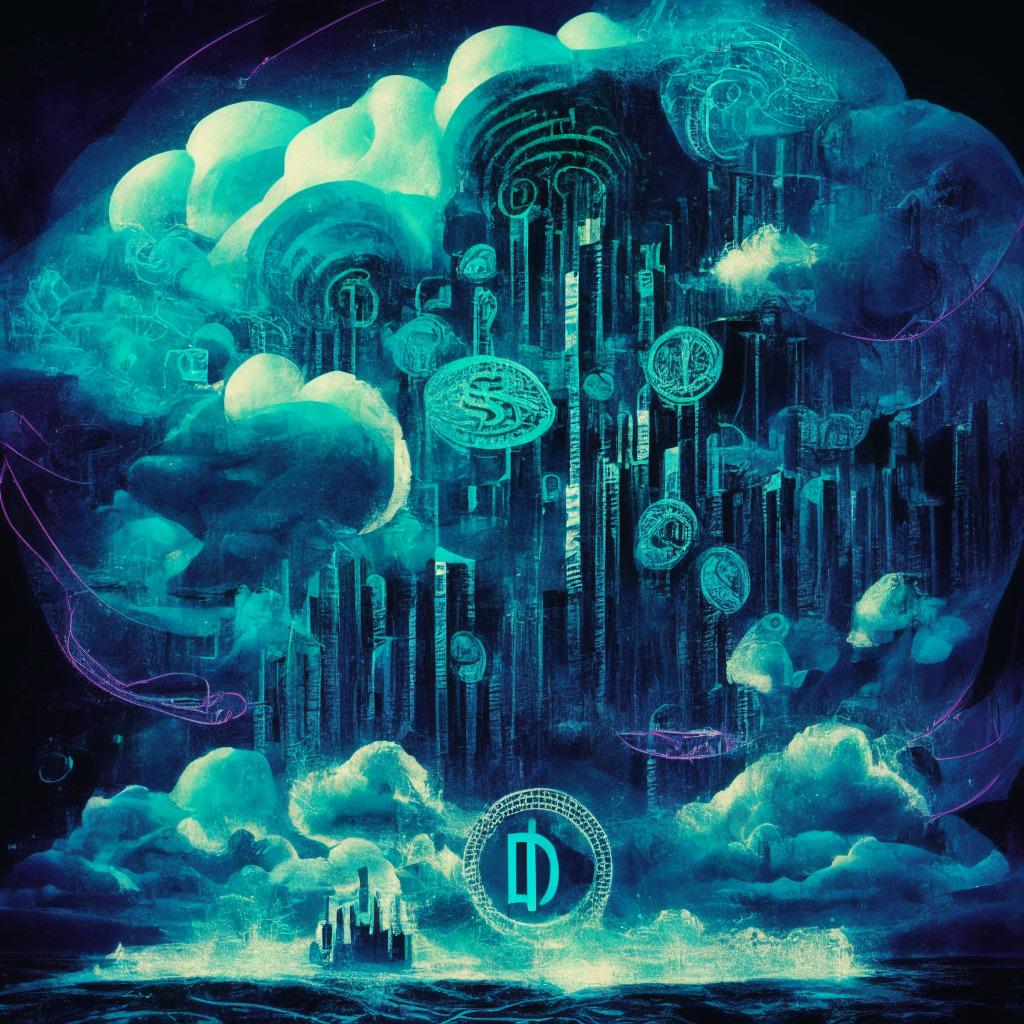South Korea’s central bank is collaborating with the Bank for International Settlements for a test run on wholesale central bank digital currencies (CBDCs) seeking to assess the feasibility of setting South Korea’s future monetary framework based on CBDCs. The test project focuses on the CBDC’s efficiency as a settlement asset and its programmability potential.
Category: Technology
Disrupting the Bitcoin Mining Industry: Unpacking the Bitcoin Minetrix Project
“Bitcoin Minetrix has emerged as a potential game-changer in the field of tokenized Bitcoin cloud mining. Their Stake-to-Mine paradigm offers users the opportunity to mine Bitcoin by staking tokens, resulting in a redistribution of mining profits from corporates to retail investors. This approach provides a high yield return, offering both access and inclusivity to the Bitcoin mining process.”
Artistry Reimagined: How Blockchain Propels the Digital Renaissance by Matt Kane
“Matt Kane, celebrated digital artist and software developer, has reshaped the creative industry through blockchain technology, using it to put forth innovative digital artwork. His work dips into understanding identity through art, marking a dramatic transformation in the digital art space and the unbounded potential of blockchain.”
CoinDCX’s Integration of Transak: Fostering User-Centric Globalization or Inviting Regulatory Complexity?
CoinDCX has expanded its self-custody wallet, Okto, through its integration with the on-ramp platform, Transak. This move enhances transactions, boosts supported tokens and expands its reach globally. However, potential regulatory issues and complexities from involving a multitude of tokens cannot be overlooked.
Gemini’s $24 Million Bet on India’s Potential as a Web3 Innovator: Motives and Challenges
Gemini’s APAC CEO and Global CTO, Pravjit Tiwana, highlights India’s potential as a key innovator in the Web3 arena, backed by a $24 million investment plan from Gemini. Tiwana cites India’s digital transformation history and unparalleled software development talent as factors for its potential leading role in shaping the Web3 landscape.
Wirex’s W-Pay: Future DeFi Gamechanger or Just Another Crypto Wild Card?
Wirex’s new service, W-Pay, introduces a non-custodial crypto debit card service leveraging Zero-Knowledge (ZK) proofs-based technology. This service offers a new way of interacting with cryptocurrencies daily, promising swift, secure transactions, and sole control over funds. However, ongoing challenges with partnership dependencies may pose questions about the technology’s reliability.
Establishing Authenticity in a Digitized World: Nodle, Adobe, and Linux Join Forces
Nodle has collaborated with Adobe and the Linux Foundation to create a blockchain-based solution, named ContentSign, for verifying the authenticity of real-world content. This kit verifies data integrity from its inception, and could be beneficial for sectors like journalism, where authenticity proof is essential. The technology also faces challenges due to the rapid AI advancements, requiring robustness and adaptability to maintain its effectiveness.
Navigating Blockchain and NFTs with a Pumpkin Spice Latte: A Leap into Starbucks’ Odyssey
Starbucks is celebrating the 20th anniversary of its Pumpkin Spice Latte with non-fungible token (NFT) collectibles through its web3 rewards platform, Starbucks Odyssey. These NFTs, named “The PSL Collection: Spiced Stamp,” exhibit a unique merger of blockchain tech and customer loyalty programs, indicating the potential future of blockchain technology in the world of big brands.
Unpacking HKEX’s Blockchain Revelation: Synapse’s Potential Amid Crypto Concerns
HKEX has introduced Synapse, an equities settlement acceleration platform utilizing smart contracts to enhance post-trade activities and operational efficiency. Planned to be incorporated into Stock Connect, it aims to support investment in over 1,000 mainland Chinese stocks and streamline cross-border transactions. Concerns persist, however, following a major Ponzi scheme within Hong Kong’s crypto sphere. Despite challenges, the push towards a secure and efficient digital financial world continues.
Argentina’s Economic Reformation: The Pros and Cons of Central Bank Digital Currency Adoption
Argentina’s economic committee is exploring the integration of Central Bank Digital Currencies (CBDCs) as a solution to the country’s economic problems. The digital peso can provide transparency, improve taxation and potentially bring stability to the economy. CBDC’s potential to reform the financial ecosystem is currently a major topic of discourse.
Marathon Digital’s Stellar Performance: Navigating the Volatile Crypto Market Successfully
“Marathon Digital has boosted its monthly Bitcoin production rate by 20%, resulting in a rise in its share prices. The Bitcoin miner produced 1,242 BTC in September, marking a 16% growth from August and a massive 245% increase year-over-year. This productivity surge is attributed to improved operations domestically and internationally and a decrease in curtailment activities in Texas.”
Hong Kong’s Synapse Program: Automation Innovation or Vulnerability Invitation in the Crypto Sphere?
“Synapse, an augmented version of HKEX’s Stock Connect program, introduces smart contracts for improved operational efficiency in equities settlement. The initiative offers enhanced real-time visibility and scalability, underlining HKEX’s commitment to capital markets’ efficacy. However, it raises questions about reliance on technology and the potential security risks it might bring.”
Unwrapping the Mystery: The Power and Pitfalls of Wrapped Tokens in Blockchain
‘Wrapped’ crypto tokens are cryptocurrencies linked to another coin or asset, often native to a certain blockchain. They allow for cross-chain interoperability and decentralised finance applications, enhancing liquidity and accessibility. However, they also raise centralisation risks, potential security issues and regulatory uncertainties.
Navigating Change: The Dynamic Shifts in Polygon’s Leadership and Impact on Blockchain Future
“Polygon, a renowned Ethereum layer 2 scaling solution, is entering a new phase of development, marked by significant shifts in its leadership. Co-founder Jaynti Kanani steps back, while Marc Boiron becomes CEO, in sync with Polygon’s transition to Polygon 2.0, which bring substantial technological innovations in blockchain systems.”
Immutable’s Blockchain Gaming Revolution: Promise of Golden Age or Expectations Trap?
Immutable is set to launch its Ethereum-based gaming platform, Immutable zkEVM, aiming to enhance the revenue model, player experience, and developer journey in the gaming world. With over 50 games committed to it, the platform is also planning technical upgrades to ensure better compatibility with Ethereum, aiming to foster a harmonious operational relationship between the two platforms.
South Korea’s Journey to a Central Bank Digital Currency: Anticipation, Advancement and Ambiguity
The South Korean central bank, BOK, is advancing towards a Central Bank Digital Currency (CBDC) pilot, scheduled for late 2024. By testing a wholesale CBDC model first, it aims to streamline inter-bank settlements while preparing for retail use. The bank collaborates with domestic institutions and international bodies like the BIS, though it remains undecided on fully endorsing a digital won.
Decentralized Social Media App Stars Arena Catalyzes Avalanche’s Growth – An Analysis of Pros and Cons
“Decentralized social media application, Stars Arena, a clone of Friend.tech, significantly boosted Avalanche’s network activity, spurring daily transactions by over 186% in two days. However, despite over 10,000 active wallets and $3.26 million trading volume, it falls short compared to Friend.tech’s $44.27 million Total Value Locked, raising questions about its potential.”
Assessing Blockchain Impact on Financial Inclusion: Stellar, PwC Framework and Challenging Skepticism
The Stellar Development Foundation and PricewaterhouseCoopers (PwC) have launched a financial inclusion framework to assess the effectiveness of blockchain projects in emerging markets. They found that blockchain-based payments enhance accessibility, reduce transaction costs, and increase transaction speed, notably in financially underserved areas. However, they stress on the importance of responsible design principles and robust governance to mitigate potential challenges and criticism.
Advancing AI Capabilities: Google Bard’s Integration and the Privacy Paradox
Google’s move to integrate advanced, browser-based AI program Bard into Google Assistant could revolutionize user interaction. Bard harnesses the ability to undertake complex tasks like composing essays or codes, raising concerns about privacy imbalance. DBHelper
PayPal and the NFT Market: Innovative Strides or Potential Disaster?
“PayPal has lodged an application for an NFT marketplace patent, hinting at a system facilitating the transfer and purchase of NFTs. However, the volatility of NFTs and regulatory gray areas surrounding digital assets pose potential risks and challenges.”
Blockchain Meets Traditional Finance: A Tale of Progress and Caution from Hong Kong Stock Exchange
The Hong Kong Stock Exchange (HKEX) is integrating blockchain technology via a new platform, “Synapse,” using smart contracts to enhance operational efficiency in financial markets. However, the growing adoption of blockchain also highlights the urgent need for robust security measures and stronger oversight due to risks such as fraud.
Revolutionizing Scientific Funding: The Emergence of DAOs and Blockchain Technology
“Decentralized Autonomous Organizations (DAOs), utilizing blockchain technology, are advocated by Nature science journal as transformative in securing funds for underfunded research fields. By disrupting traditional funding models, DAOs democratize funding procedures, potentially realign resources from only prestigious institutions to more varied sectors.”
Telegram’s Blockchain-based Super-App: An Encroaching Security or Blessing in Disguise?
“Telegram’s Open Network (TON) has received major investment from MEXC exchange, aiming to enhance TON’s role in shaping Telegram’s journey towards becoming a Web3 super-app. However, concerns over security measures are being raised given the potential risks posed by blockchain platforms and crypto transactions.”
LinkedIn’s AI-Assistants Join the Recruitment Game: Revolutionary or Risky?
LinkedIn is incorporating AI into its operations to help recruiters and learners, despite skepticism about loss of human touch in such processes. Advocates argue that AI provides time-saving benefits and tailors content, with 74% LinkedIn users noting time savings after the introduction of AI-assisted messages when recruiting. The ongoing debate about AI’s pros and cons continues, but its growing incorporation into various industries is undeniable.
Central Banks and Blockchain: A New Monetary Order or a Balancing Act?
Denis Beau, the first deputy governor of Banque de France, advocates Central Bank Digital Currencies (CBDCs) as the future of the global monetary system. However, he acknowledges the potential risks of crypto technologies. He believes that CBDCs need to focus on cross-border payments and invites a partnership between public and private sectors for efficiency. Beau proposes that CBDCs follow established models from the Bank for International Settlements and International Monetary fund. Despite skepticism, project collaborations like Project Mariana indicate the ongoing exploration of CBDCs and blockchain technology.
El Salvador’s Volcano Energy: Disrupting Crypto Mining with Renewable Power and Risking It All
El Salvador partners with Luxor Technology, with support from Tether, for its first renewable energy Bitcoin mining operation through Volcano Energy. This ambitious billion-dollar project aims to make El Salvador a powerhouse in renewable energy and Bitcoin mining. However, inherent challenges and critics question the appropriateness of using renewable energies for crypto mining.
Crypto Future Predictions: A Diverging Path or Unanimous Inevitability?
“Jonathan DeYoung and Ray Salmond discuss the future of cryptocurrencies, highlighting the importance of project advancement over token price. They predict the crypto path is heading towards mass adoption, but also caution against the potential domineering entry of powerful players that could alter its essence.”
Argentina’s Undertow: The Inflation Crisis and the Divisive Role of Digital Currencies
Argentine presidential candidate, Sergio Massa, champions the implementation of a Central Bank Digital Currency (CBDC) to tackle Argentina’s high inflation. Arguing for a financial transformation, Massa envisions digital currency as a key to economic parity. However, crypto-community remains skeptical about government-controlled digital currency, worrying about corruption and potential for tax manipulation.
Central Bank Digital Currencies: Monumental Opportunity or Fraudulent Abyss?
“The Bank of Korea initiates pilot project to design infrastructure for a central bank digital currency (CBDC), aiming to enhance cross-border payments and potentially establish a new international monetary system. However, the journey towards CBDC’s full implementation isn’t guaranteed and potential pitfalls in the unregulated crypto world can nurture high stakes and fraud risks.”
CBDCs: A Cornerstone for Future International Monetary System & the Tokenization of Finance
The Banque de France views central bank digital currency (CBDC) as a crucial component for the new international monetary system, enhancing cross-border payments. It’s being considered from an international perspective right from the outset. Two potential development pathways include building interoperability with legacy systems and creating regional or international platforms for CBDCs.
Decoding CryptoNight: Champion of Mining Democracy or Falling Giant?
The CryptoNight mining algorithm, a feature of the CryptoNote protocol, aims to prevent the centralization of mining power by allowing CPUs and GPUs to mine blocks. Despite criticisms and ASICs adapting, it remains a successful tool advocating privacy and fairness in mining.
Emerging NFT Powerhouse: Exploring OpenSea Studio’s Potential and Future Challenges
OpenSea introduces OpenSea Studio, a comprehensive tool for creators of NFT projects offering full control over the NFT drop process, direct minting, and compatibility with multiple blockchains. The platform’s intuitive interface eliminates the need for technical expertise, facilitating easier NFT project creation and acquisition through credit or debit cards.































